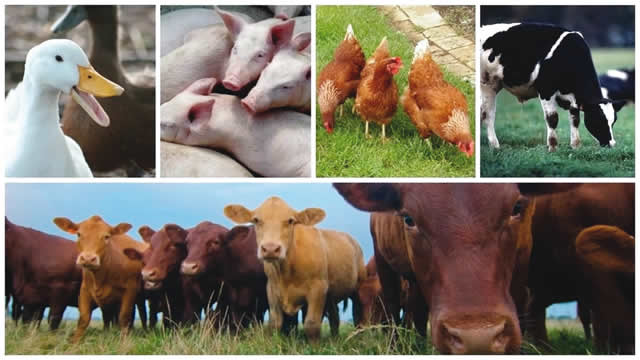
In spite of having about 156.31 million ruminants—including cattle, camels, goats, and sheep—Nigeria trails behind Benin Republic, Burkina-Faso, Mauritania, Chad, Niger Republic and Kenya in its livestock-GDP contribution.
Benin Republic holds a total ruminant population of 4.86 million, with 16 per cent pastoralists to the human population, contributing 42 per cent to the national agriculture GDP.
Burkina-Faso has a 32.28 million ruminant population, representing 11.5 per cent pastoralists to human population and contributes 55 per cent to the national agricultural GDP.
In Chad, the total ruminant population as of September 2023 was 19.5 million. With 40 per cent of its citizens being pastoralists, Chad’s livestock market accounts for 44 per cent of its agricultural GDP.
Mauritania’s total ruminant population is 13.08 million, with 42.5 per cent pastoralists to the human population and a 53 per cent contribution to the national agricultural GDP.
Niger Republic boasts a total ruminant population of 39.10 million, a 17 per cent pastoralists-to-total-human-population and contributes 33 per cent to its agric GDP.
At least 64.4 million ruminants currently roam Kenya. With 18.4 per cent of its total population practicing pastoral farming, they contribute 44.4 per cent to the national Agric GDP.
Although these countries have lesser ruminant populations than Nigeria, Sunday PUNCH observes from the report of the National Livestock Reforms Committee that they contribute more substantially to their respective GDPs.
Despite its vast ruminant population, Nigeria reaps only 10 per cent of its agricultural GDP from livestock, with just 7.6 per cent of its population involved in pastoral activities.
The general agricultural sector in Nigeria has recently seen a slight dip. In July 2023, the Q2 report of the National Bureau of Statistics stated that agriculture contributed 21.07 per cent to the nominal GDP, a decline from the same period in 2022.
Nigeria’s agricultural sector is said to comprise four sub-activities: crop production, livestock, forestry and fishing.
Crop production remains the dominant player, making up 88.06 per cent of the sector’s overall nominal value in the same quarter.
On September 14, the National Livestock Reforms Committee suggested that President Bola Tinubu should create a Ministry of Livestock Resources.
The former Kano State Governor and Chairman of the All Progressives Congress, Abdullahi Ganduje, disclosed the committee’s recommendations after an audience with the President at the Aso Rock Villa, Abuja.
This move, Ganduje argued, would boost livestock production yields and curtail the long-standing violent clashes between farmers and nomadic cattle herders nationwide.
The recommendation forms part of the 21 proposed solutions to enhance the government’s comprehensive approach to the prevailing challenges.
A professor of Agricultural Extension and Development Communication at the University of Ibadan, Muhammed Kuta, in an interview with our correspondent said with its number of ruminants, Nigeria had no business importing over N100bn of dairy products quarterly.
Kuta argued that the creation of a Ministry of Livestock Resources was essential, adding, “You can imagine smaller countries with smaller populations of livestock doing better than Nigeria in terms of contribution to agricultural GDP. That’s not acceptable. That is not the best for Nigeria.
“We have the potential in terms of human capacity to participate in the activities along the livestock value chain and most importantly, we have the market. With a population of over 200 million people, you don’t need to clamour for a market because those importing milk and dairy products into Nigeria are already smiling home every quarter with about N100bn.
“Those countries producing these dairy products are not up to Niger State by size. We have the landmass for ranching and ungoverned spaces that we can use.”
He however expressed hope that the President would heed the recommendation of the livestock committee, saying, “We are sure that, this time round, something will be done for Nigeria, especially given our comparative advantage.”





